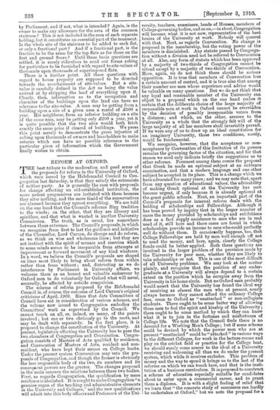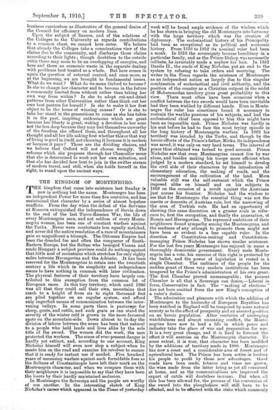REFORM AT OXFORD. T HE best tribute to the moderation and
good sense of the proposals for reform in the University of Oxford, which were issued by the Hebdomadal Council to Con- gregation last Saturday, is that they satisfy the extremists of neither party. As is generally the case with proposals for change affecting an old-established institution, the more ardent progressives are irritated with them because they alter nothing, and the more timid of the conservatives are alarmed because they uproot everything. We are told on the one hand that the Council's reforms fling tradition to the winds ; on the other, that they are illusory and spiritless, and that what is wanted is another University Commission. The truth, as is usual, lies somewhere between these extremes. The Council's proposals, in which we recognise from first to last the guidance and initiative of the Chancellor, Lord Curzon, do change and do reform, as we think on wise and wholesome lines ; but they are not instinct with the spirit of menace and coercion which to some minds seems to be inseparable from attempts at improvement or forward movement of any kind whatever. In a word, we believe the Council's proposals are shaped on lines most likely to bring about reform from within rather than from without ; and, distrusting as we do interference by Parliament in University affairs, we welcome them as an honest and valuable endeavour by Oxford men to do voluntarily for Oxford what will never, assuredly, be effected by outside compulsion. The scheme of reform proposed by the Hebdomadal Council is, of course, the outcome of Lord Curzon's original criticisms of April, 1909. Since that date Committees of Council have sat in consideration of various schemes, and the volume now issued to Congregation embodies the Committees' work as supervised by the Council. We cannot touch on all, or, indeed, on many, of the points involved ; but one or two obviously go to the roots, and may be dealt with separately. In the first place, it is proposed to change the constitution of the University. At present, legislation affecting the University has to pass the two chambers of Congregation and Convocation. Congre- gation consrist's of Masters of Arts qualified by residence, and Convocation of Masters of Arts, resident and non- resident, who have kept their names on College books. Under the present system Convocation may veto the pro- posals of Congregation, and though the former is obviously the less responsible body of the two, its numbers and its consequent powers are the greater. The changes proposed in the main concern the relations between these two bodies. First, as regards Congregation, the qualification by mere residence is abolished. It is sought to make Congregation "a genuine organ of the teaching and administrative elements in the University and Colleges," and the new qualifications will admit into this body officers and Professors of the Uni- versity, teachers, examiners, heads of Houses, members of College-governing bodies, and so on,—in short, Congregation will become, what it is not now, representative of the best brains of the University at work. Nobody will quarrel with that. Next, as regards Convocation. No change is proposed in the membership, but the voting power of the members is diminished. Any statute passed by Congrega- tion without a division need not be referred to Convocation at all. Also, any form of statute which has been approved by a majority of two-thirds of Congregation cannot be vetoed except by a majority of two-thirds of Convocation. Here, again, we do not think there should be serious opposition. It is true that members of Convocation lose a certain amount of control, and it is true also that among their number are men whose experience and advice would be valuable on many questions. But we do not think that any loyal and reasonable member of the University can object to a proposal which on the one hand makes it certain that the deliberate choice of the large majority of responsible men at work in Oxford cannot be overridden by the decision of possibly irresponsible voters from a distance; and which, on the other, assures to the University as a whole that the strongly felt will of the large majority of all her members shall invariably prevail. If we were any of us to draw up an ideal constitution for an imaginary University, those two conditions, surely, would be fundamental.
We recognise, however, that the acceptance or non- acceptance by Convocation of this limitation of its powers remains the governing factor of the situation, and for that reason we need only indicate briefly the suggestions as to other reforms. Foremost among them comes the proposal that Greek be made an optional subject at an entrance examination, and that a modern language and one other subject be accepted in its place. This is a change which we have advocated for many years ; and we may note that, apart from any question of educational values, the advisability of making Greek optional at the University has now become urgent, if only because it is already optional at the great public schools. Next, an important part of the Council's proposals for internal reform deals with the holding of scholarships and Fellowships. Although it has been proved by inquiry that in the larger number of cases the money provided by scholarships and exhibitions does as a fact supply assistance to men who are in real need of it, still here and there cases are found in which scholarships provide an income to men who could perfectly well do without them. It occasionally happens, too, that College Fellowships are held by men well enough off not to need the money, and here, again, clearly the College funds could be better applied. Both these questions are involved in the larger problem of the provision made by the University for poor men, whether they are likely to take scholarships or not. This is one of the most difficult of all University problems. We may look at the matter plainly, and recognise that the position of any under- graduate at a University will always depend to a certain extent on the position which he occupies away from the University in his home circle. But no Oxford man probably would assert that the University has found the ideal way of receiving as alumni the men who at present, nearly always because they cannot afford the ordinary College fees, come to Oxford as " unattached " or non-collegiate students. There ought to be some better way of allowing these men to feel the spirit and kinship of the University; there ought to be some method by which they can know what it is to join in the fortunes and misfortunes of College life. We note that the Council finds there is no demand for a Working Men's College ; but if some scheme could be devised by which the poorer men who are at present " unattached " could be " attached " in various ways to the different Colleges, for work in the lecture-rooms and play on the cricket field or practice for the College boat, we should surely come nearer to the ideal of a University receiving and welcoming all than we do under the present system, which while it receives excludes. This problem of money and the way to spend it brings us to the last of the reforms on which we can touch here, and that is the insti- tution of a business curriculum. It is proposed to construct a scheme of education especially suitable for candidates about to enter upon a commercial career, and to grant them a diploma. It is with a slight feeling of relief that we learn that "the concrete study of commerce can hardly be undertaken at Oxford," but we note the proposal for a business curriculum as illustrative of the general desire of the Council for efficiency on modern lines. Upon the subject of finance, and of the relations of the Colleges to the University as regards contributions to a common chest, we cannot here enter. We believe that already the Colleges take a conscientious view of the claims due to the community, and discharge those claims according to their lights; • though doubtless to the outside critic there may seem to be an overlapping of energies, and here and there an economic waste in the separate dealing with problems best treated as a whole. But here comes in again the question of external control, and once more, as at the beginning, we are brought to fundamental issues. What do we want ? What do we mean Oxford to become ? Is she to change her character and to become in the future a community limited from without rather than taking her own way from within ? Is she to adopt cut-and-dried patterns from other Universities rather than think out her own best pattern for herself ? Is she to make it her first object to be the home of winning causes ? Or is she to take her stand in the generations to come as she has taken it in the past, inspiring enthusiasms which are great because her liberty is great, waking a devotion in her sons not the less deep because they may feel themselves unworthy of the freedom she offered them, and throughout all her thought and all her life asking first whether this or that Way of living is good in itself, not choosing it because it is modern or because it pays ? Those are the dividing choices, and we believe that Oxford will not choose wrongly. The reforms which she proposes through her Chancellor mean that she is determined to work out her own salvation, and that she has decided how best to join in the swifter stream of modern travel, and still, when she holds herself in the right, to stand upon the ancient ways.











































 Previous page
Previous page